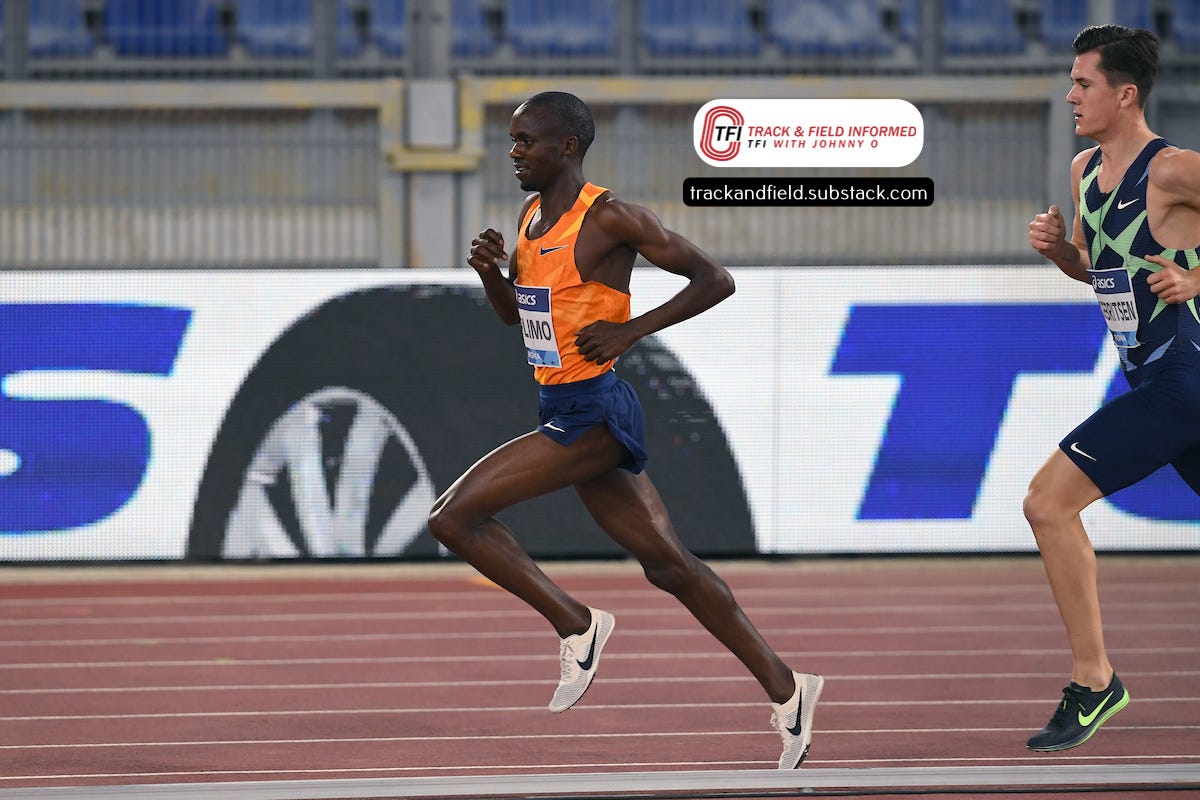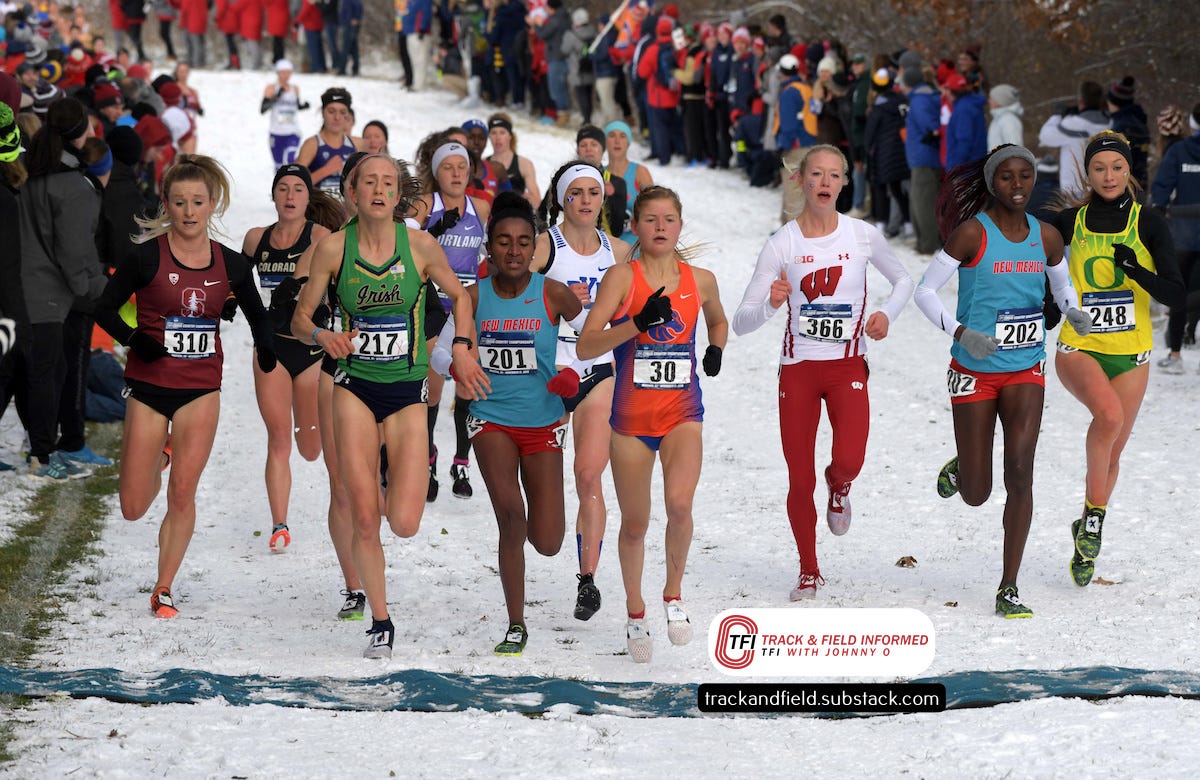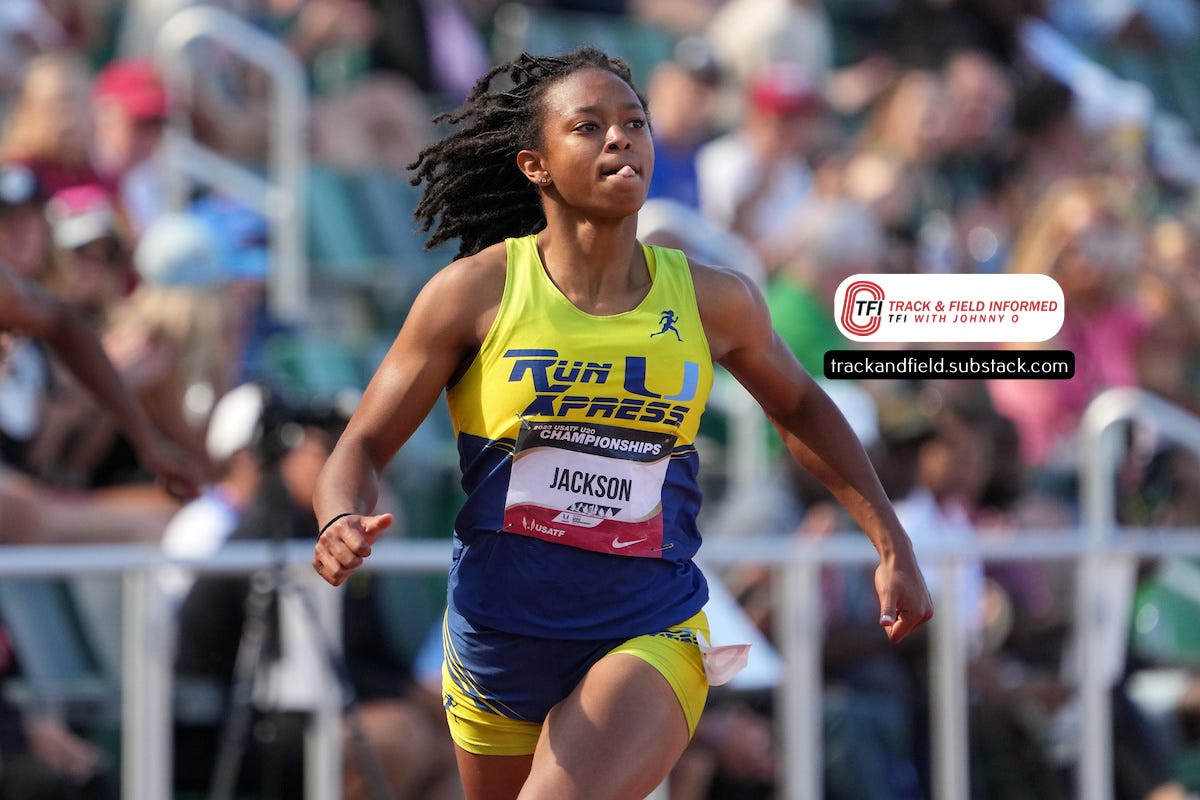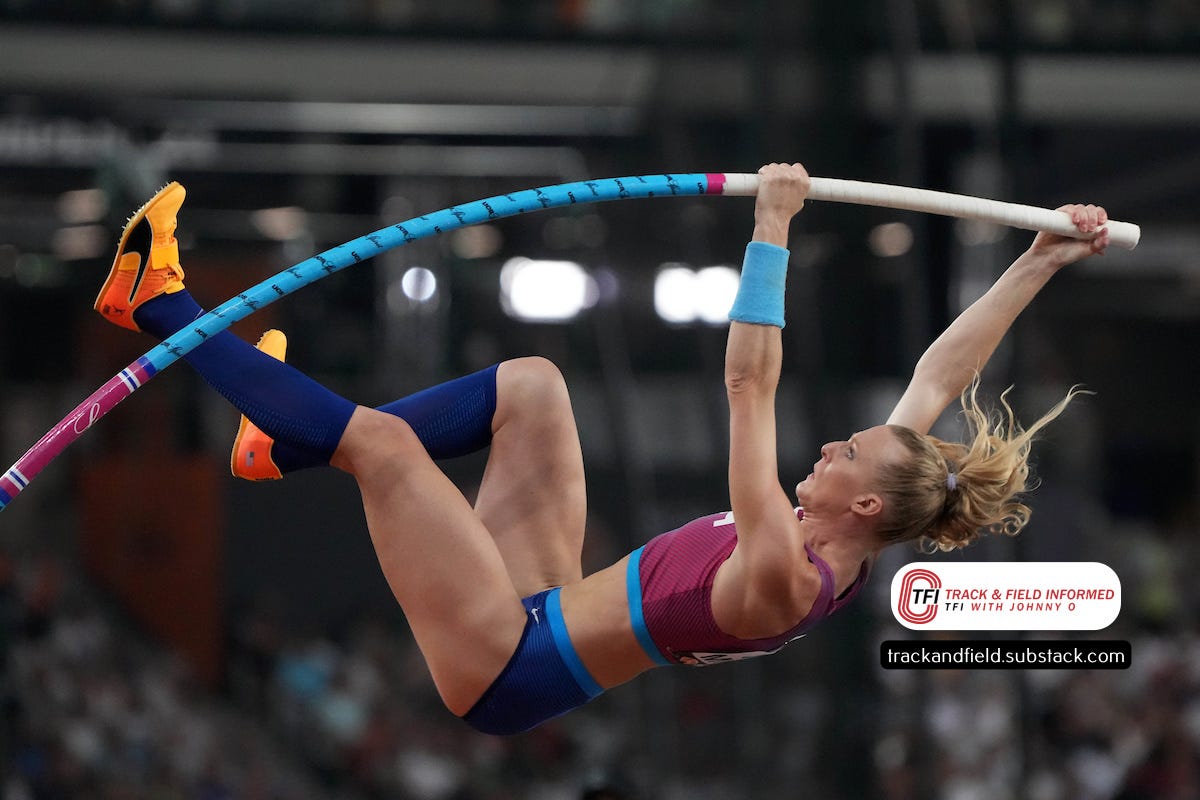Week in Review: Ngetich continues roll with scintillating performance in Spain
Kenyan lops 28 seconds off world record in women's 10k road race in Valencia

For the second time in four months, Agnes Jebet Ngetich of Kenya appeared to have broken a world record in a women’s 10-kilometer road race in the Valencia Ibercaja 10k event on Sunday.
Running in warm and somewhat breezy conditions, the 22-year-old runner clocked a stunning 28 minutes 46 seconds over the flat and fast 10,000-meter course in the third-largest city in Spain.
The time, which came in a race in which Jacob Kiplimo of Uganda won the men’s title in 26:48, was nearly half a minute faster than the previous women’s world record of 29:14 set by Yalemzerf Yehualaw of Ethiopia in 2022. However, one of the first steps of the world record ratification process will involve a remeasurement of the course to verify that it is in fact 10 kilometers in length.
While that might seem like a formality, it should be noted that Ngetich lost a world record of 29:24 for a women’s-only 10,000-meter road race in Brasov, Romania, in September when a remeasurement of the course after her apparent record performance determined that the layout was 25 meters short of 10 kilometers.
After following that effort with a winning time of 29:26 in the Urban Trail de Lille race in Lille, France, on Nov. 18, Ngetich was focused on bettering Yalemzerf’s world record when she toed the starting line on Sunday.
With Kenyan Japheth Kipkemboi Kosgei handling the early pace-setting duties, Ngetich and compatriots Emmaculate Anyango, and Lillian Rengeruk passed the three-kilometer mark in 8:29.
Ngetich then tied the recently-set world record for five kilometers when she came through the halfway point in 14:13, followed by Anyango in 14:14, and Rengeruk in 14:25.
Anyango, who had run 30:01 in finishing second to Ngetich in Lille, began to fall back of her countrywoman around the 20:30 mark of the race on Sunday, but she would nonetheless go on to post the second-fastest road time in history.
Although Ngetich’s pace had slowed some when she came through 8,000 meters in 23:10 after running the previous three kilometers in 8:57, her projected finish time was 28:57.5 based on her split at that point in the race.
She then proceeded to pick up the pace during the remainder of the contest.
She clocked 5:36 over the final two kilometers to obliterate her previous best by 40 seconds and — assuming the course distance was 10 kilometers — become the first woman in history to have bettered 29 minutes for 10,000 meters on the road or on the track, where the record of 29:01.03 was set by Letesenbet Gidey of Ethiopia in 2021.
Anyango became the second woman to have run under 29 minutes when she crossed the finish line in 28:57.
Rengeruk finished third in 29:32 to move to fourth on the all-time performer list in the road 10,000 while fellow Kenyan Janeth Chepngetich placed fourth in 29:55 to move to 11th, and Ugandan Joy Cheptoyek was fifth in 30:03 to move to 15th.
Overall, a record 14 women ran under 31 minutes, topping the previous high of seven set in the adizero Road to Records race in Herzogenaurach, Germany, last year.
“Honestly, my clear goal was to break the world record but 28:46 is beyond any expectations,” Ngetich said in a World Athletics post. “When I saw 14:13 by half way I didn't scare, it just motivated me a lot to keep on pushing until the end.
“I have no words to describe what I feel now.”
After ending 2020 with a personal best of 15:56.4 for 5,000 meters, Ngetich lowered her best to 15:07.34 while finishing eighth in the Kenyan trials race for the Olympic Games in 2021. She also ran road bests of 15:02 in the 5k and 31:20 in the 10k that year before running 30:30 in finishing second in the Brasov Running Festival 10k in 2022.
She began last year by finishing third in the World Athletics Cross Country Championships in Bathurst, Australia, in February and later placed sixth in the 10,000 meters in the World Athletics Championships in Budapest, Hungary, in August before her exploits on the roads in September and November.
She said on Sunday that she will now turn her focus to qualifying for the Kenyan squad that will attempt to defend its team title in the World Cross Country Championships in Belgrade, Serbia, on March 30, before looking to make the national team — in the 10,000 — that will compete in the athletics portion of the Olympic Games in Paris in August.
“I’ll be doing the Kenyan trials for Belgrade, where I would like to improve on my bronze medal from last year," she said.
Bouncing back strong: After missing the World Athletics Championships in Budapest, Hungary, last August, as well as the World Athletics Road Running Championships in Riga, Latvia, on Oct. 1, while recovering from an injury to his right hamstring, Jacob Kiplimo of Uganda has won three races since returning to competition.
The first victory came in the Cross Internacional de Atapuerca in Spain on Oct. 29.
The second occurred in the NN Zevenheuvelenloop in Nijmegen, the Netherlands, on Nov.19 when he tied the world best of 41:05 for 15 kilometers.
The third took place in the Valencia Ibercaja 10k on Sunday when the 23-year-old runner clocked 26:48 over the flat course in the third largest city in Spain while posting a 10-second margin of victory.
Kiplimo, who holds the world record in the half marathon at 57:31, was content to follow pace setter Mohamed Reda of Morocco through the first two kilometers in 5:17 before he and Kenyan Dennis Kibet Kitiyo had broken away from the lead group by the four-kilometer mark.
That pair had a six-second lead over Berhanu Balew of Bahrain, Peter Mwanki Njeru of Kenya, and Dominic Lobalu of Switzerland when they passed 5,000 meters in 13:20.
Kiplimo, who won the men’s race of the World Cross Country Championships in Bathurst, Australia, in February, broke away from Kitiyo at the 15-minute mark before passing through seven kilometers in 18:35.
He then ran the final 3,000 meters in 8:13 while moving to fifth on the all-time performer list.
Balew finished second in a Bahrainian record of 26:58, followed by Njeru in 26:59, Kitiyo in 27:01, and Lobalu in 27:13.
Njeru and Ktiyo set personal bests with their efforts, while Lobalu tied the European and Swiss record set by Julien Wanders in 2020.
“I came to Valencia to run a fast time and I just did, so I'm quite satisfied,” Kiplimo said in a World Athletics post. “I'm still doubtful on competing at the World Cross Country Championships in Belgrade as my primary goal this year is the Olympic Games where I would like to double in the 5000 and 10,000.”
Kiplimo has personal bests of 12:41.73 in the 5,000 and 26:33.93 in the 10,000, times that put him in a tie for sixth in the 5,000 and in eighth in the 10,000 on the all-time performer lists in those events.
Successful drop in distance: Sutume Asefa Kebede of Ethiopia entered the Aramco Houston Half Marathon on Sunday best known for her exploits in the marathon.
She left it tied for ninth on the all-time performer list after her time of 1 hour four minutes 37 seconds left her a minute and half in front of second-place Hellen Obiri of Kenya in the women’s division and bettered the previous course best of 1:05:03 set by Vicoty Chepngeno of Kenya in 2022. That mark had been the fastest time ever run by a woman in a half marathon on North American soil before Sunday.
“I was training for a very fast time,” Kebede said in a Houston Chronicle post.
Kebede, who had lowered the official world best in the infrequently-contested 25-kilometer run to 1:18:47 in winning the Tata Steel 25k Kolkata event in Kolkata, India, four weeks earlier, was running with Obri when they came through the 5k mark in 15:15 and past 10 kilometers in 30:28.
But the 29-year-old Ethiopian had a five-second advantage over the defending Boston and New York City marathon champion when she passed 15 kilometers in 45:42 and her lead had grown to 73 seconds when she came through the 20k mark in 1:01:18.
Kebede, who set a personal best of 2:18:12 in finishing second in the 2022 Seoul Marathon, then tacked on another 17 seconds to her advantage during the final portion of the race.
Obiri finished second in 1:06:07, followed by Buze Diraba of Ethiopia in 1:06:24, Weini Kelati of the U.S. in a national record of 1:06:25, and Mestawut Fikir of Ethiopia in 1:07:36.
Kelati, the 2019 NCAA women’s cross country champion for the University of New Mexico, was making her half marathon debut in Houston after lowering her personal bests to 8:32.50 in the 3,000, 14:53.41 in the 5,000, and 31:04.16 in the 10,000 during the 2023 track season.
“I didn’t know what to expect, but I’m glad I got [the American record],” Kelati said in the Houston Chronicle post. “I want to keep running half marathons. This means a lot. Because coming here, I did not expect anything, because this was my first. I didn’t know how it was going to feel. It feels special, because we have good distance runners [in the U.S.].”

Victorious return: Jemal Mekonen of Ethiopia won the men’s division of the Aramco Houston Half Marathon for the second time on Sunday after winning his first title in 2020.
The win did not come easily for the 27-year-old Mekonen as his winning time of 1:00:42 left him a second in front of runner-up Wesley Kiptoo of Kenya and three seconds in front of compatriot Milkesa Menghesa in third and American Abbabiga Simbasa in fourth.
Diego Estrada of the U.S. had a five-second lead when he came through the first five kilometers in 14:17, but he was part of a five-runner lead pack that also included Mekonen, Menghesa, Simbasa, and Peter Njeru of Kenya when the quintet went through 10 kilometers in 28:32.
The lead group had grown to seven runners when it came through the 15-kilometer mark in 43:10 to 43:11, but it was down to the eventual top-five finishers when Kiptoo, Menghesa and Simbasa came 20 kilometers in 57:46, a second ahead of Mekonen and Estrada.
Mekonen, the winner of the Antrim Coast Half Marathon in Larne, Northern Ireland, in 2021 and ’22, and Kiptoo soon separated from the other three before Mekonen was able to open a small lead on Kiptoo that he maintained to the finish line.
“I prepared in training to show how great the course was,” Mekonen said through a translator in a Houston Chronicle post. “It worked out well. I’d love to come back and run here again.”
Personal best fest: Zouhair Talbi of Morocco and Rahma Tusa of Ethiopia took significant amounts of time off their personal bests in winning the men’s and women’s divisions, respectively, of the Chevron Houston Marathon on Sunday.
The 28-year-old Talbi ran 2:06:39 to win his first marathon in his third race at the distance and the 30-year-old Tusa ran 2:19:33 while topping her previous best of 2:23:20 and posting her fifth victory in 19 career marathons.
Talbi ran a very well-paced race as he clocked 1:03:40 for the first half of the contest and 1:02:59 for the second.
He was in fifth place — in 30:09 — when Hendrik Pfeiffer of Germany led the field through 10 kilometers in 29:46. And he was still in that position when he and Kenta Uchida of Japan passed the 20-kilometer mark in 1:00:20.
Pfeiffer had a one-second lead over second-place Tsedat Ayana of Ethiopia when he came through 20 kilometers in 59:40.
Those two still had a 40-second advantage over third-place Zalbi when they passed 25 kilometers in 1:14:54, but the Moroccan had cut his deficit to 33 seconds when he came through 30 kilometers in 1:30:41.
He was only eight seconds out of the lead when he came through 35 kilometers in 1:45:26 and he had an 18-second advantage over second-place Ayana and a 22-second lead over third-place Pfeiffer when he clocked 2:00:12 at 40 kilometers
After running the previous 10 kilometers in 29:31, his fastest 10K split of the race by more than 30 seconds, Zalbi finished 21 seconds ahead of Ayana while bettering his previous best of 2:08:35 that he had run in finishing fifth in the Boston Marathon last year.
Ayana placed second in 2:07:00, followed by Pfeiffer in a personal best of 2:07:14, Pat Tiernan of Australia in a personal best of 2:07:45, and Hugo Catrileo of Chile in a national record of 2:08:44.
In the women’s race, Tusa was in a four-runner lead pack when she came through 10 kilometers in 32:48 and 15 kilometers in 49:17.
The lead group had shrunk to her, compatriot Bosena Mogesie and Vicory Chepngeno of Kenya when she came through 20 kilometers in 1:05:44, the halfway mark in 1:09:23, and 30 kilometers in 1:38:40.
Tusa took control of the race during the next five kilometers as she was 12 seconds ahead of second-place Chepngeno when she came through 35 kilometers and nearly a minute up on Mogesie.
She was 14 seconds up on Chepngeno when she came through 40 kilometers in 2:12:08 and she extended it to 22 seconds when she crossed the finish line in 2:19:33 to win her first marathon since winning the last if three consecutive Rome Marathon titles in 2018.
Chepngeno’s 2:19:55 clocking made her the 76th woman in history to break 2:20 and left her well ahead of third-place Tesgaye Melesch of Ethiopia (2:24:50), fourth-place Deborah Schoneborn of Germany (personal best of 2:24:54), and fifth-place Jovana de la Cruz Capani of Peru (personal best of 2:26:49). Mogesie placed sixth in 2:26:59.
Collegiate record No. 3: Yusuf Bizimana of the University of Texas registered the third collegiate record of the 2023-24 indoor track and field season and the first of 2024 when he won the men’s 1,000 meters in 2:18.10 in the University of Kentucky Rod McCravy Memorial at the Norton Healthcare Sports & Learning Center in Louisville last Friday.
The defending NCAA indoor champion in the 800 bettered the previous record of 2:18.26 set by Brannon Kidder of Penn State in 2016 and also moved to fourth on the all-time Great Britain and Northern Ireland performer list in his first-ever race at the one-kilometer distance.
Bizimana, a 23-year-old senior, received some nice pacing help from junior teammate Cole Lindhorst, who led the race through 200 meters in 27.70 seconds, 400 in 54.58, and 600 in 1:22.33 before dropping out of the race midway down the backstretch of the fourth lap on the 200-meter oval.
Yusuf, who had clocked 27.93, 54.70 (26.77), and 1:22.52 (27.82) for the first three laps, came through 800 meters in 1:50.36 (27.84) before crossing the finish line more than six seconds in front of sophomore teammate Chris Riley (2:24.73).
In an impressive display of a well-paced racing, Bizimana ran his final three laps in 27.82, 27.84, and 27.84.
Bizimana posted the following on his Instagram account (@flybizzy) after his record run:
Quality starts: In a match-up that is expected to occur numerous times during the course of this year, Devynne Charlton of the Bahamas edged Masai Russell of the U.S. in the women’s 60-meter hurdles on the second day of the University of Kentucky Rod McCravy Memorial on Saturday.
Charlton, the silver medalist in the 60 hurdles in the 2022 World Athletics Championships in Belgrade, Serbia, ran 7.88 seconds to the 7.89 of training partner Russell, who was a two-time runner-up in the 60 hurdles in the NCAA championships for the University of Kentucky in 2022 and ’23.
The 28-year-old Charlton, who placed fourth in the 100 hurdles in the World Athletics Championships in Budapest, Hungary, last year, had run 7.99 in her first-round heat on Friday before clocking 7.98 in her semifinal on Saturday.
Russell, who set a collegiate record of 12.36 in the 100 hurdles outdoors as a Wildcat senior last year, ran 8.09 in her heat and 7.96 in her semifinal.
Impressive debut: Sanu Jallow turned in a pair of high-quality efforts in her first meet while competing for the University of Arkansas in the Arkansas Invitational at the Randal Tyson Indoor Center in Fayetteville last Friday.
The sophomore transfer from Texas A&M won the women’s 600 meters in 1:26.52 and also ran a 51.91-second anchor leg on an Arkansas squad that finished second in its heat — to another Arkansas foursome — in 3:30.48.
Jallow’s time moved her to third on the all-time collegiate performer list behind Britton Wilson of Arkansas (1:25.16 last year) and Athing Mu of Texas A&M (1:25.80 in 2021), and gave her a comfortable margin of victory over Oklahoma State senior Gabija Galvydyte, who finished second 1:28.48.
Jallow, who has outdoor personal bests of 53.15 in the 400 and 2:05.68 in the 800, registered 200-meter splits of 26.98, 27.72 (56.70), and 29.82 (1:26.52) during her 600.
Galvydyte was within a second of Jallow after two laps, but she lost more than a second to her during the final 200-meter circuit.
Strength work: The freshman year of Shawnti Jackson of the University of Arkansas got off to a good start in the Arkansas Invitational last Friday when she turned in the fastest time of the meet in the 400 at 52.10 seconds and ran a 51.71 anchor leg on a Razorback foursome that placed first in 3:28.79.
Jackson set a national high school record of 10.89 seconds in the women’s 100 in June of last year before running a personal best of 22.35 to win the 200 in the Pan American U20 (under 20) Championships in Mayaguez, Puerto Rico, in August.
She ran her first 200 meters in 24.08 seconds on Friday before running her second lap in 28.02 (52.10) to finish well in front of the 53.14 clocking of Paris Peoples of the U.S.
Jackson’s effort slashed nearly three seconds off her previous indoor best of 54.94 that she had run as a high school junior. She has an outdoor best of 52.54 from her sophomore year.

Notable 300s: Senior Kennedy Lightner of the University of Kentucky and sophomores Christopher Morales Williams of Georgia and Judson Lincoln IV of Virginia Tech were collegians who turned in noteworthy performances in the men’s 300 meters in three different indoor meets last weekend.
Lightner moved to fourth on the all-time collegiate list when he ran 32.45 seconds in the University of Kentucky Rod McCravy Memorial at the Norton Healthcare Sports & Learning Center in Louisville last Friday.
Canadian Morales Williams moved to sixth with his 32.47 clocking in the Clemson Invitational on Saturday, and Lincoln IV moved to 11th with a 32.60 effort in the Virginia Tech Invitational on Saturday.
For good measure, American Brian Faust had the fastest time in the Clemson Invitational when his 32.36 effort in the eighth heat of the 300 turned back former Georgia standout Matthew Boling (32.84).
Junior Justin Robinson of Arizona State ran 32.52 in winning the Friday Night Axe ‘Em Open in Flagstaff, Arizona. But that time is not eligible for inclusion on the all-time collegiate lists because it came on a 300-meter track at the J. Lawrence Walkup Skydome on the campus of Northern Arizona University.
Quality win: Luke Houser of the University of Washington, the defending NCAA indoor champion in the men’s mile, won the 3,000 meters in 7:40.40 in the Washington Indoor Preview meet at the Dempsey Indoor on Saturday.
The Husky senior, who has run 3:52.87 in the mile indoors, turned back a field that included second-place Kieran Lumb of Canada (7:40.53), third-place Sam Prakel of the U.S. (7:41.17), and fourth-place Habtom Samuel of Eritrea and the University of New Mexico (7:45.61) while racing on the 307-meter oval.
Lumb and Prakel finished fifth and third, respectively, in the men’s mile in the World Athletics Road Running Championships in Riga, Latvia, last October.
Samuel, a freshman at New Mexico, was the runner-up in the NCAA Cross Country Championships in November and he has run 13:13.74 for 5,000 meters and 27:20.08 for 10,000.
Summit meeting: Americans Sandi Morris and Chris Nilsen won the women’s and men’s titles, respectively, in the National Pole Vault Summit at the Reno Livestock Events Center in Reno, Nevada, last Friday.
Morris, the defending World indoor champion, cleared 4.82 meters (15 feet 9¾ inches) in defeating a field that included defending Olympic and two-time defending World outdoor champion Katie Moon of the U.S.
Moon, employing an approach that was shorter than what she will use later in the year, tied for second place with Anicka Newell of Canada, as both vaulters cleared 4.53 (14-10¼) on their third attempts.
The 31-year-old Morris cleared 4.43 (14-6¼), 4.53 (14-10¼), 4.63 (15-2¼) on her first attempts. She then cleared 4.75 (15-7) on her second effort and 4.82 (15-9¾) on her third.
The 4.82 clearance was the highest height Morris has made since the 2022 World Championships in Eugene, Oregon, when she and Moon — whose last name was Nageotte at that time — both cleared 4.85 (15-11).
Nageotte was awarded the gold medal in that meet because she cleared 4.85 on her first attempt and Morris made the height on her second try.
Nilsen, who tied for third in the World Championships last year, cleared 5.90 (19-4¼) in the Pole Vault Summit. American Zach Bradford and Frenchman Thibaut Collett each cleared 5.82 (19-1), but Bradford was awarded second place based on the tiebreaker.
The 26-year-old Nilsen opened his competition by clearing 5.45 (17-10½) on his first attempt, and he also made 5.60 (18-4½), 5.72 (18-9¼), and 5.82 (19-1) on his first tries.
He then cleared 5.90 on his third — and final — attempt before passing at 5.96 (19-6¾) and missing three times at 6.01 (19-8½).

No Glasgow for Ingebrigtsen: Jakob Ingebrigtsen of Norway, the defending Olympic champion in the men’s 1,500 meters and the two-time defending World champion in the 5,000, will not compete in the World Athletics Indoor Championships in Glasgow, Scotland, from March 1-3 due to recent issues with one of his Achilles tendons.
In a January 12 post on the Norwegian site dagsavisen.no, Ingebrigtsen wrote in a press release that “I know my body, and it sometimes happens that it needs a little extra time to heal before I start with hard loads. I’ve been struggling a bit with an achilles and have therefore trained a bit alternatively. Now I’m on my way back, but I don’t want to take any risks. Therefore, I run my own scheme a little more, I know what works. For me, it’s EC and Olympic medals that matter.”
The European Athletics Championships will be held in Rome from June 7-12 and the athletics portion of the Olympic Games in Paris will be held from Aug. 1-11.
This is the second time in the last month and a half that Ingebrigtsen has withdrawn from a major competition.
The first occurred when European Athletics announced on Nov. 20 that two-time defending champion Ingebrigtsen had withdrawn from the European Cross Country Championships in Brussels on Dec. 10 due to an injury.
According to a post on the nrk.no site, the injury Ingebrigtsen had sustained was in the area of his sacrum, which is the large bone located at the base of the spine that is shaped like an upside-down (inverted) triangle and connects to the pelvis.
Ingebrigtsen’s injury came after the best track season of his career as he won the 5,000 meters and placed second in the 1,500 in the World Athletics Championships for the second year a row when the meet was held in Budapest, Hungary, in August.
Prior to those championships, he had set a world best of 7:54.10 in the two mile and lowered the European record to 3:27.14 in the 1,500 to move to fourth on the all-time performer list.
After the global title meet, he lowered the world record to 4:43.13 in the 2,000 meters before concluding his outdoor season with a scintillating double in the Prefontaine Classic in Eugene, Oregon, when he turned in the third-fastest times in history while winning the mile in 3:43.73 on Sept. 16 and the 3,000 in 7:23.63 the following day.
Looking forward: The Boston Athletics Association announced last week that Hellen Obiri of Kenya will defend her women’s title when the 128th edition of the Boston Marathon is held on April 15.
The 34-year-old Obiri, who won the Boston and New York City marathons last year, will face a field that includes 11 women who have run under 2 hours 20 minutes in the event, including seven who have broken 2:19.
Workesh Degefa of Ethiopia, who lowered her personal best to 2:15:51 in winning the Valencia Marathon in Spain on Dec. 3, is the fastest entrant in the field, with compatriots Tadu Teshome and Hiwot Gebremaryam having the second- and third-fastest personal bests at 2:17:36 and 2:17:59.
Obiri, a two-time World champion in the 5,000 meters, is the No. 17 entry based on her best of 2:21:38, but she ran that time in winning the Boston Marathon last year while most of the top entrants in this year’s race have produced their fastest times on courses that are much flatter and faster than the Boston layout which is known for its hills.
Kenyans Judith Korir, the silver medalist in the 2022 World Athletics Championships, and Sharon Lokedi, who won the 2022 New York City Marathon in her marathon debut, are some of the other notable entrants.
Emma Bates of the U.S. is also entered in the race after announcing earlier this month that she was going to bypass the U.S. Olympic Trials race in Orlando, Florida, on Feb. 3 because injuries had set back her training and she would not be fit enough in time to contend for the top-three finish in that race.
Bates ran a personal best of 2:22:10 in finishing fifth in Boston last year, but she sustained a plantar fascia injury during the New York City Marathon in November and ended up placing 13th in 2:25:04.
She took some time to recover from that injury, but her training was later slowed by shin splits.
Turning pro: Kenneth Rooks, who won the men’s 3,000-meter steeplechase in the NCAA Championships and the USA Track & Field Outdoor Championships last year, announced on social media last week that he was going to turn professional and would forgo his final year of eligibility at BYU.
The 24-year-old Rooks had moved to third on the all-time collegiate performer list last year when he ran 8:17.62 to win the steeplechase in the Track Festival meet at Mt. San Antonio College in Walnut, California, in early May. But he lowered his best to 8:16.78 in winning the USA Track & Field title two months later, despite having fallen to the track after hitting a barrier with more than five laps left in the race.
He then placed 10th in 8:20.02 in the World Athletics Championships in Budapest, Hungary, in August.
He wrote in a social media post that he will represent Nike as a professional runner and continue to train in Provo, Utah, under the auspices of BYU coach Ed Eyestone.






